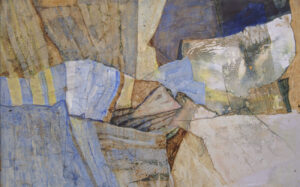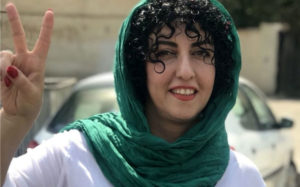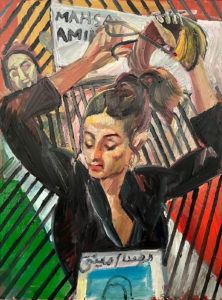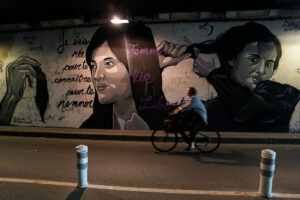
In the inaugural issue of Poetry Markaz, we present this searingly defiant poem by beloved Spanish poet Ángel Guinda (1948-2022), who passed away earlier this year. With this poem we honor the memory of Mahsa Amini, the 22 years young woman who was brutally murdered by the Islamic Republic of Iran’s “morality police” for not fully covering her hair. Since then, her name has become like a glowing ember, alive and radiating heat, and blown by the wind of discontent it has fast traveled across Iran and set the country on fire. Brave young women and men have taken to the streets. Guinda’s poem echoes their shouts that they will not be silenced.
Let us also remember the novelist Salman Rushdie who was attacked by a deranged zealot on Aug. 12. I say “deranged” because a mind twisted by blind devotion to any ideology that incites violence is neither balanced nor sane.
In 1989 Islamic Republic of Iran’s Supreme Leader, Khomeini, issued an edict demanding Rushdie’s death over his novel The Satanic Verses. What is disturbing is that most people who accepted Khomeini’s edict and blindly called the novel blasphemous never had read the novel for themselves, nor ever wondered why a fictional character in a novel should prompt a fatwa against its author.
Yet Rushdie, despite all efforts to silence his pen, has kept on writing fearlessly while vocally advocating freedom of expression for all.
To take away any life in the name of God is to assume one is intimate with that Unknowable Divine. Isn’t that a greater “sin” than making up characters for stories and calling them works of fiction, or asking for our God-given liberty to exist as dignified human beings, with liberty to choose how to worship, dress, and exist within the bounds of a peaceful democracy?
Dear readers, look closely. God weeps behind the mask tattooed on its face.
—Poetry Markaz editor, Sholeh Wolpé
Poem by Ángel Guinda
Escribir
Si me quitan la palabra escribiré con el silencio.
Si me quitan la luz escribiré en tinieblas.
Si pierdo la memoria me inventaré otro olvido.
Si detienen el sol, las nubes, los planetas,
me pondré a girar.
Si acallan la música cantaré sin voz.
Si queman el papel, si se secan las tintas,
si estallan las pantallas de los ordenadores,
si derriban las tapias, escribiré en mi aliento.
Si apagan el fuego que me ilumina
escribiré en el humo.
Y cuando el humo no exista
escribiré en las miradas que nazcan sin mis ojos.
Si me quitan la vida escribiré con la muerte.
Published in Poemas para los demás, Ángel Guinda (Olifante 2009)
I Will Write
If they take away my word,
I will write with silence.
If they take away my light,
I will write with the density of darkness.
If I lose my memory,
I will invent another form of oblivion.
If they seize the sun, the clouds,
snatch away the planets,
I will spin in my orbit.
If they shut away the music
I will chant without a voice.
If they torch the paper,
evaporate the ink,
detonate computer screens,
and smash all walls,
I will write on my breath.
If they extinguish the fire
that brightens me,
I will write on the smoke.
And when the smoke is gone
I will write on visions born
without my eyes.
If they take away my life,
I will write with my death.
(translated from the Spanish by Sholeh Wolpé)



















